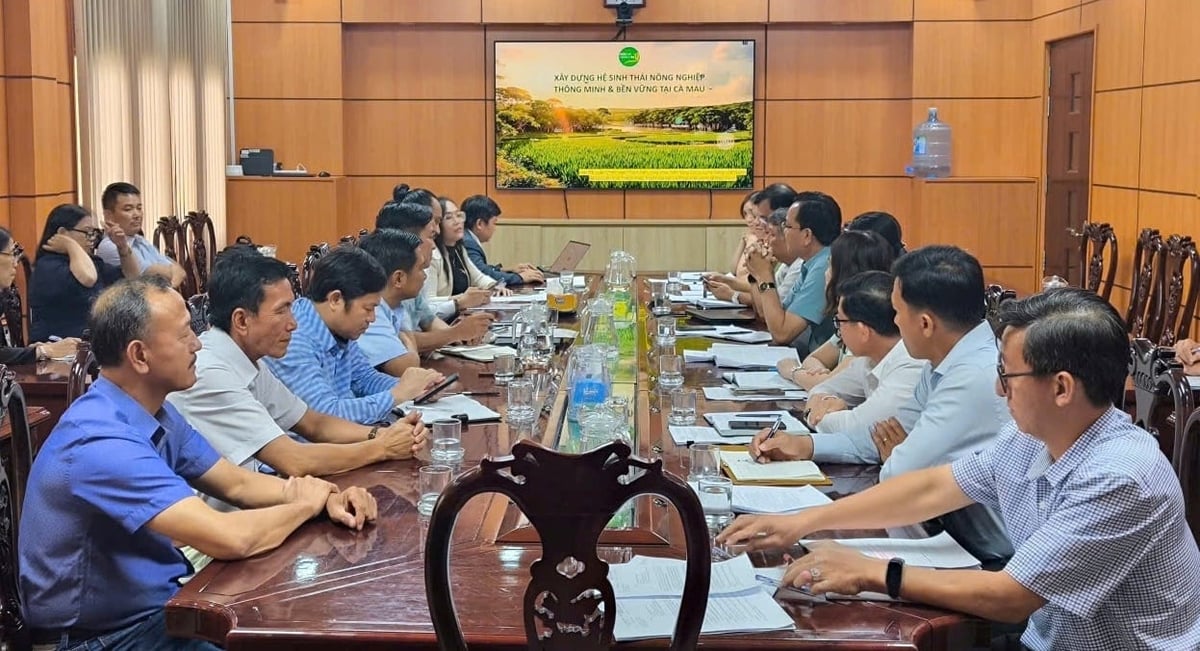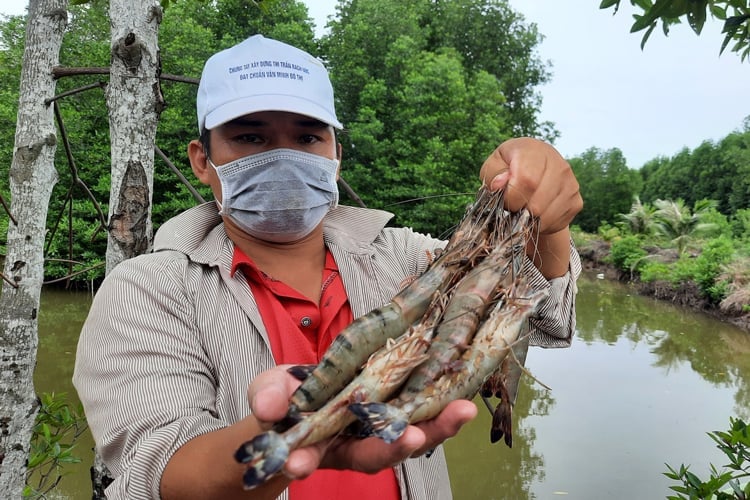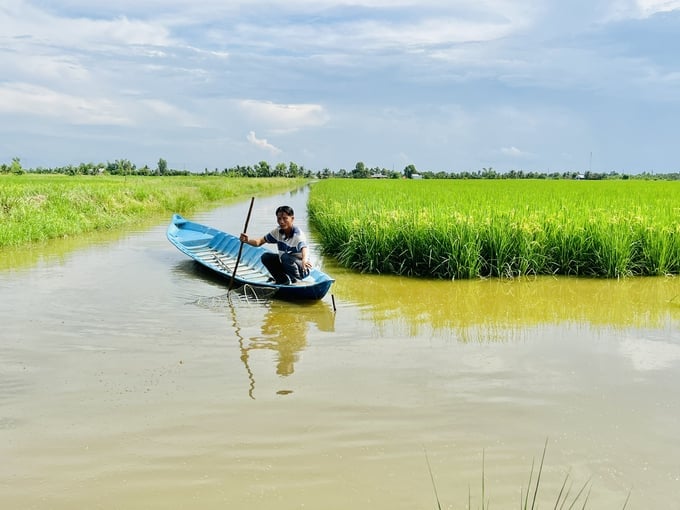December 9, 2025 | 08:56 GMT +7
December 9, 2025 | 08:56 GMT +7
Hotline: 0913.378.918
December 9, 2025 | 08:56 GMT +7
Hotline: 0913.378.918
On July 28, in Ca Mau City, leaders from various departments and agencies of Ca Mau province held a working session with Toan Cau Organic Co., Ltd. to discuss and evaluate a project for building a smart and sustainable agricultural ecosystem. This initiative aims to establish a circular agricultural model by utilizing advanced technology, promoting green development, and adjusting to the effects of climate change.
Representatives from Toan Cau Organic Co., Ltd. presented a comprehensive proposal during the meeting, which concentrated on the implementation of the Glorin technology platform and a green model in order to generate a significant improvement in the agricultural economy of Ca Mau. Glorin is a technology system that is presently in the patenting process and is capable of integrating automated insurance through smart contracts on the blockchain, issuing carbon tokens, real-time environmental monitoring via IoT sensors, and authenticating product origins.

Glorin Platform's Capabilities and Project Components Toan Cau Organic Co., Ltd. working with representatives from departments and agencies of Ca Mau province. Photo: Vo Ha.
The Glorin platform also facilitates the integration of digital assets, such as carbon credits, with state management tools, such as organic certificates or land use rights, thereby providing producers with the ability to access official credit. The project comprises two primary components that are closely linked together, thereby generating synergistic value within a closed ecosystem.
The first component, "Awakening the Green Lung - Unlocking a Billion-Dollar Market", concentrates on the 4,000 hectares of mangrove forests in Ca Mau. Due to the high prices in the international Blue Carbon market, this region is anticipated to generate approximately 1.5 million tons of CO2e credits annually, resulting in revenues ranging from 22.5 to 52.5 million USD. Its carbon absorption capabilities are 5-10 times greater than those of terrestrial forests.
In addition, an international-standard shrimp aquaculture model under the forest canopy (ASC, GlobalGAP) will employ IoT technology to optimize production, resulting in a 30-50% increase in product value. The Japanese and Korean markets will bring in 7 - 10 million USD in revenue, and 150–200 jobs will be created as 50,000 tons of biomass pellets and biochar are produced annually from forest by-products, including wood and leaves.
The second component of the project, "Elevating ST25 Rice—5-in-1 Cooperation Model," endeavors to elevate the image of Vietnam's ST24 and ST25 rice grains through a comprehensive partnership with local agricultural cooperatives. This is a concrete step toward realizing the Government-initiated Project for 1 Million Hectares of High-Quality, Low-Emission Rice, which has the potential to be implemented on 120,000 hectares of rice land in Ca Mau.

The shrimp-forest model has significant potential for development in Ca Mau. Photo: Trong Linh.
Toan Cau Organic Co., Ltd. has proposed a "5-in-1" cooperation model that entails the following: the provision of DNA-authenticated salt-tolerant rice seeds and organic microbial fertilizers; the free deployment of the Glorin platform and an IoT sensor system; the organization of a minimum of four training sessions annually; the commitment to purchase 100% of standard-compliant output at a price that is 10–15% higher than the market, with payment made within 24 hours via smart contracts; and the provision of financial support by advancing 50% of crop value and offering non-refundable grants of 10–20 million VND/hectare for projects that implement new technologies. A smart parametric insurance package will provide coverage for risks associated with weather and natural calamities, with automatic payouts within 48 hours of an incident.
A strong commitment of the project is that no one will be left behind. From 2025 to 2027, Phase 1 is anticipated to generate 100 to 200 direct employment opportunities, establish forest protection and planting contracts for 500 households, train 50 eco-tourism guides, and offer technical assistance to 300 shrimp producers. It is important to note that a Community Development Fund will be directly allocated to the local community through a Decentralized Autonomous Organization (DAO) on the Glorin platform, which the local people themselves will administer. This will ensure complete transparency. Specifically, 10 to 15% of the net revenue from carbon credit sales and tourism will be allocated to the fund.

Production paradigm for organic shrimp and rice in Ca Mau. Photo: Trong Linh.
"We are not merely rehabilitating the land; we are also transforming mindsets", stated Dr. Tong Van Hai, the scientific counsel to Toan Cau Organic Co., Ltd., during the meeting. Farmers will be able to proactively manage risks, assume ownership of their assets, and become digital agricultural entrepreneurs due to the Glorin platform and the new cooperation model.
Ms. Nguyen Viet Chinh, the Chairwoman of the Board of Members of Toan Cau Organic Co., Ltd., also expressed her enthusiasm and confidence in Ca Mau's potential. She shared her experiences from similar projects in An Giang (162 hectares of high-quality, low-emission rice) and Dak Nong (nearly 3,000 hectares of forest and medicinal plants combined with eco-tourism).
"With over a decade of preparation, we came to Ca Mau not just with financial resources, but also with comprehensive solutions and sincere hearts. We are committed to long-term partnership to realize the vision of a green Ca Mau jointly", Ms. Chinh emphasized.
Mr. Phan Minh Chi, Deputy Director of the Department of Agriculture and Environment of Ca Mau province, highly praised the initiative and commitment of Toan Cau Organic Co., Ltd. He announced that the Department will collaborate with pertinent parties to conduct field surveys, gather data in the proposed project areas, and utilize this information to finalize the proposal for submission to the Provincial People's Committee for consideration and operation.
Translated by Linh Linh
/2025/12/01/2936-2-222331_70.jpg)
(VAN) Mortgaging his house and giving up a pharmaceutical management career, Mr. Nguyen Quang Duy succeeded in bringing Khanh Hoa's sea grapes to demanding markets such as Japan and the U.S.

(VAN) The large-scale agroforestry investment project aims to develop a leading sustainable agro-industrial center in Angola.
/2025/11/28/3433-1-212821_213.jpg)
(VAN) Many localities across the coconut land of Vinh Long are replicating emission-reducing models in production and daily life, contributing to the targets for emission reduction and green economic development.

(VAN) The green transition is an inevitable path for collective economy to achieve balanced growth and align with global trends.

(VAN) The TH Group is not only Vietnam’s leading clean-milk producer; it is also leaving a strong mark on sustainable development as it pursues the goal of carbon neutrality.
/2025/11/27/3830-1-152901_403.jpg)
(VAN) Dong Nai is developing its key crop areas, expanding planting area codes, and applying high technology to increase the value of agricultural products, aiming at a green and sustainable agriculture.

(VAN) Tay Ninh’s livestock sector is undergoing a major transformation, applying high-tech, closed-loop circular models to build sustainable value chains.